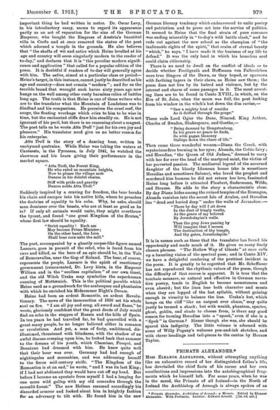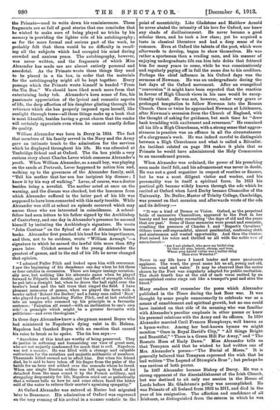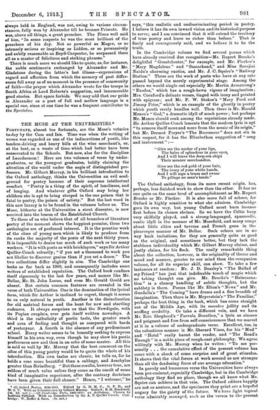PRIMATE ALEXANDER.* Miss ELEANOR ALEXANDER, without attempting anything like an
exhaustive record of her distinguished father's life, has dovetailed the chief facts of his career and her own recollections and impressions into the autobiographical frag- ments which he himself left. For some years, when be was in the mood, the Primate of all Ireland—in the North of Ireland the Archbishop of Armagh is always spoken of as
• Primate Alerander, Archbishop ofAu,namhu a Memoir. Edited by Eleanor Alexander. With Portraits. Loudon : Edward Arnold. [128. 6d, net.] the Primate—used to write down his reminiscences. These fragments are so full of good stories that one concludes that he wished to make sure of being played no tricks by his memory in providing the lighter side of his autobiography; as for the more formal and serious part of the work, he probably felt that there would be no difficulty in recall- ing all the subjects which had occupied his mind during crowded and anxious years. The autobiography, however, was never written, and the fragments of which Miss Alexander has made use are almost entirely personal and anecdotal. As the Primate wrote these things they used
to be placed in a tin box, in order that the materials for the autobiography might all be kept together. Every passage which the Primate wrote himself is headed "From the Tin Box." We should have liked much more from that entertaining lucky tub. Alexander's keen sense of fun, his passionate appreciation of the lyrical and romantic aspects of life, the deep affection of his daughter glinting through the reticence which she has properly imposed upon herself, like sunlight through trees—all these things make up a book that is most likeable, besides having a great charm that the reader will certainly appreciate even when be cannot exactly define its quality.
William Alexander was born in Derry in 1824. The fact that members of his family served in the Navy and the Army gave an intimate touch to the admiration for the services which be displayed throughout his life. He was educated at Tonbridge School and at Oxford. The tin box yields a very curious story about Charles Lever which concerns Alexander's youth. When William Alexander, as a small boy, was playing on the sands at Portrush, Lever happened to notice him and, walking up to the governess of the Alexander family, said, "Tell his mother that her son has incipient hip disease ; I know it by his way of walking." Lever, of course, was a doctor besides being a novelist. The mother acted at once on the warning, and the disease was checked, but the lameness from which Alexander suffered in the latter part of his life was supposed to have been connected with this early trouble. While Alexander was still at school an episode occurred which may amuse those who are interested in coincidences. A school- fellow had seen letters to his father signed by the Archbishop of Canterbury, and one day in Alexander's presence he amused himself by imitating the Archbishop's signature. He wrote "John Cantuar " on the flyleaf of one of Alexander's lesson books. Alexander first punched his head for his impertinence, and then, not to be outdone, wrote "William Armagh "—a signature to which he earned the lawful title more than fifty years later. Cricket seemed to the young Alexander the greatest of games, and to the end of his life he never changed that opinion.
"I admired Fuller Pilch and looked upon him with reverence. I saw the beginning of his decadence one day when he hit three or four catches in succession. There are longer innings occasion- aIly now, but nothing like his alternate game when he played forward to Pilgarth bent double, and the effort of strength which he put into a straight bat, when he drove the ball right over the bowler's head and tho tall trees that ringed the field. I have pleasant memories of games, when we played the town with a bowler called Robert the Barber,' and a funny man called Boot' who played forward, imitating Fuller Pilch, and at last subsided into an umpire who summed up his principle in a favourite sentence: 'Fairation all round—with an inclination to one's own side'--a principle which might be a greater favourite with politicians—and even theologians."
In these days Alexandew knew a clergyman named Boyes who bad ministered to Napoleon's dying valet in St. Helena. Napoleon had thanked Boyes with an emotion that caused his voice to break as be spoke. The tin box says :—
" Anecdotes of this kind are worthy of being preserved. They do justice in softening and humanizing our view of great men, who are not unjustly condemned for much that is evil. Napoleon was not a monster. Ho was filled with a strange and culpable enthusiasm for the resistless and majestic arithmetic of numbers. Thousands killed seemed not to affect him. But when his friend died, he is said to have taken off his finger from the pulse of the battle for an hour and sobbed over the comrade whom he loved. When one single Russian soldier was left upon a block of ice detached from the mass round it by the French artillery, and struggling desperately for life, Napoleon cried out so pathetically that a. witness tells us how he and some others faced the bitter cold of the water to relieve their master's agonizing sympathy."
At Oxford Alexander was entered at Exeter but migrated later to Brasenose. His admiration of Oxford was expressed on the very evening of his arrival in a manner ecstatic to the. point of eccentricity. Like Gladstone and Matthew Arnold he never abated the intensity of his love for Oxford, nor knew any shade of disillusionment. He never became a good scholar there, and he took a low class; yet he acquired a taste in classical literature and had a deep sense of its rotaance. Even at Oxford the talents of the poet, which were afterwards to develop, began to show themselves. He was rather a sportsman than a reading man, and his manner of enjoying undergraduate life ran him into debts that fettered him for many years to come, while he was conscientiously . and regularly paying off in full the sums due to his creditors.
Perhaps the chief influence in his Oxford days was the sermons of Newman. He was an undergraduate during the last days of the Oxford movement. After an evangelical "conversion" it might have been expected that the reaction in favour of High Church views in his case would be excep- tionally violent. He was not, however, under very grave or prolonged temptation to follow Newman into the Roman Church. Once or twice he approached Newman at Littlemore, after Newman's secession from the Church of England, with the thought of asking for guidance, but each time he "drew back trembling with excitement and reverence." He remained all his life a High Churchman, with a strong sense that aggres- siveness in practice was an offence in all the circumstances of a clergyman's work. He was indeed careful to distinguish between a High Churchman and what is called a Ritualist. An incident related on page 304 makes it plain that as Primate he would have administered the Holy Communion to an unconfirmed person.
When Alexander was ordained, the power of his preaching soon made itself felt, and his advancement was never in doubt.
He was not a good organizer in respect of routine or finance, but he was a most diligent visitor and worker, and his personality was in itself a spiritual force. In 1853 his poetical gift became widely known through the ode which he recited at Oxford when Lord Derby became Chancellor of tho University. Dr. Butler, Master of Trinity College, Cambridge, was present on that occasion and afterwards wrote of the ode and its delivery:—.
"It was a kind of Dream or Vision. Oxford, as the perpetual bride of successive Chancellors, appeared to the Poet in her beauty and her majesty recounting 'the days of old and the years that are past.' Some of these memories were proud and romantic, recalling the presence of Charles I. and 'Rupert's Cavaliers.' Others were self-reproachful, almost penitential, confessing sloth and aimlessness and wasted opportunity. And then the Orator- Poet raised his voice and thrilled us all with the noble vow of amendment— 'Am I not pledged, who gave my bridal ring To that old man, heroic, strong, and true, Whose grey-haired virtue was a nobler thing Than even Waterloo P Never in my life have I heard louder and more passionate applause. The word, the great name hit us all, young and old, 'between wind and water.' It may be observed that the metre chosen by the Poet was singularly adapted for public recitation. The short fourth lino at the end of each verso recited by an accomplished orator rings out like a trumpet's peal and stirs the blood."
Many readers will remember the poem which Alexander published in the Times during the last Boer war. It was thought by some people unnecessarily to celebrate war as a
means of ennoblement and spiritual growth, but no one could have insisted on that side of its meaning who was familiar with Alexander's peculiar emphasis in other poems or knew
his personal relations with the Army and its officers. In 1850 Alexander married Cecil Frances Humphreys, well known as a hymn.writer. Among her best-known hymns we might mention "Once in Royal David's City," "All things Bright and Beautiful," "There is a Green Hill Far Away," and "The
Roseate Hues of Early Dawn." Miss Alexander tells us that Tennyson said that he wished he had written one of Mrs. Alexander's poems—" The Burial of Moses." It is generally believed that Tennyson expressed the wish that he had written" The Legend of Stumpie's Brae "; but perhaps he was envious of both poems.
In 1867 Alexander became Bishop of Derry. He was a strong opponent of the disestablishment of the Irish Church,
but was destined to sit only one session in the House of Lords before Mr. Gladstone's policy was accomplished. He was Primate of all Ireland from 1893 to 1911, and died in the
year of his resignation. The affection and confidence of all Irishmen, as distinguished from the esteem in which he was always held in England, was not, owing to various circum- stances, fully won by Alexander till he became Primate. He was, above all things, a great preacher. The Times well said of him, "In some respects he was the most brilliant of the preachers of his day. Not so powerful as Magee, or so intensely serious or inspiring as Liddon, or so persuasively and subtly reasonable as Boyd-Carpenter, he surpassed them all as a master of felicitous and striking phrases."
There is much more we should like to quote, as, for instance, the noble sentiments exchanged by Alexander and Mr. Gladstone during the latter's last illness—expressions of regard and affection from which the memory of past differ- ences fell away as of no moment in the presence of community of faith—the prayer which Alexander wrote for the troops in South Africa at Lord Roberts's suggestion, and innumerable good stories. But space forbids. We may add that our pride in Alexander as a poet of full and mellow language is a special one, since at one time he was a frequent contributor to the Spectator.




































































 Previous page
Previous page